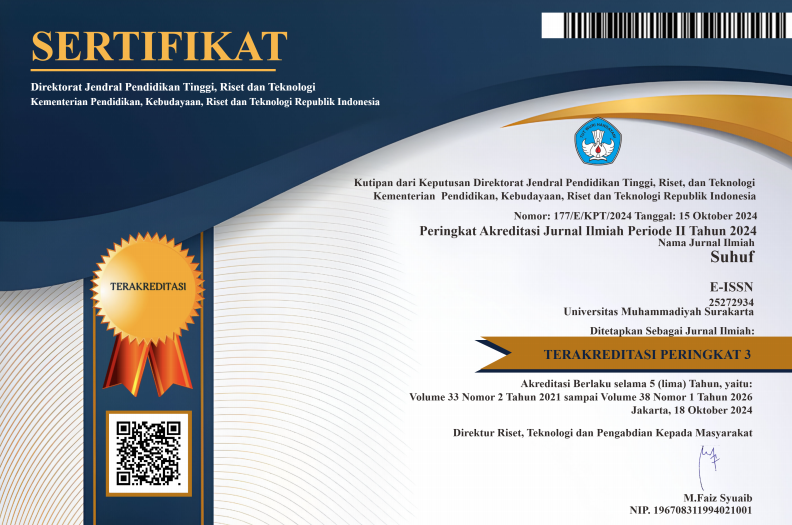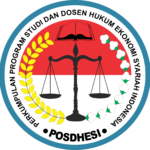Analysis of Fairness in Inheritance Distribution according to Badamai Customs among the Muslim Banjar Community in South Kalimantan
DOI:
https://doi.org/10.23917/suhuf.v37i2.13106Keywords:
Indigenous community, Equal distribution, Muslim Banjar community, Customary inheritance law, Inheritance distributionAbstract
The distribution of inheritance according to the Badamai custom is a form of customary inheritance law practised by the Muslim Banjar community in South Kalimantan. This custom results in an equal distribution pattern between male and female heirs. This study aims to analyze the value of justice within this equal distribution system using John Rawls’ Theory of Justice. Conducted as a field study with a sociological approach in South Kalimantan, the research draws on interviews with members of the Indigenous Muslim Banjar Community, community leaders, and supporting literature, including four journal articles. Viewed through Rawls’ theory, the Badamai inheritance system is considered fair because it aligns with two key principles. The first is the principle of equal liberty, which ensures that both men and women have the same fundamental right to inherit property. The second is the difference principle, which seeks to minimize inequality. By implementing equal distribution, the Badamai custom removes disparities in inheritance allocation, ensuring equal opportunities for all heirs. This study contributes to the development of Customary Inheritance Law and encourages local governments to support the establishment of the Badamai institution to help resolve inheritance-related disputes.
Downloads
References
[1] F. Ad, F. Zenrif, and Z. Mahmudi, “Pembagian Waris Pra-Kematian Pada Masyarakat Islam Jawa Perspektif Hukum Progresif [Pre-Death Inheritance Distribution in Javanese Muslim Communities from the Perspective of Progressive Law],” Al-Qadhafi J. Huk. Islam Dan Perundang-Undangan, vol. 9, no. 1, pp. 231–250, (Indonesia), 2022, doi: https://doi.org/10.32505/qadha.v9i1.4087.
[2] M. Sabri, “Persepsi hukum Islam terhadap sistem kewarisan berbasis budaya pada masyarakat Bugis Bone [Islamic Legal Perceptions of Culture-Based Inheritance Systems in the Bugis Bone Community],” Al-Risalah J. Huk. Kel. Islam (Ahwal Al-Syakhsiyyah), vol. 3, no. 1, pp. 234–256, (Indonesia), 2017, [Online]. Available: https://download.garuda.kemdikbud.go.id/article.php?article=2945205&val=26070&title=PERSEPSI HUKUM ISLAM TERHADAP SISTEM KEWARISAN BERBASIS BUDAYA PADA MASYARAKAT BUGIS BONE
[3] D. K. Anggraini and R. A. Puspitasari, “Pembagian Waris Masyarakat Aceh Hareuta Peunulang Menurut Hukum Adat [Inheritance Distribution in Acehnese Communities: Hareuta Peunulang According to Customary Law],” Indones. J. Soc. Sci. Humanit., vol. 3, no. 2, pp. 74–79, (Indonesia), 2023, [Online]. Available: https://journal.publication-center.com/index.php/ijssh/article/view/1573
[4] A. Indrasukma, “Pengelolaan Harta Pusaka Tinggi Di Minangkabau Studi Kasus Di Kubang Putiah Kecamatan Banuhampu Kabupaten Agam Sumatra Barat [The Management Of High Heritage Assets In Minangkabau: Case Study In Kubang Putiah, Banuhampu District, Agam Regency, West Sumatr,” Al-Ahwal, vol. 14, no. 1, pp. 99–111, (Indonesia), 2021, doi: https://doi.org/10.14421/ahwal.2021.14108.
[5] A. Hidayah, “Pembagian Harta Waris Menurut Adat Masyarakat Banjar Kalimantan Selatan [Distribution of Inherited Property According to the Customs of the Banjar Community, South Kalimantan],” Al Qalam J. Ilm. Keagamaan dan Kemasyarakatan, vol. 16, no. 6, pp. 2106–2130, (Indonesia), 2022, doi: http://dx.doi.org/10.35931/aq.v16i6.1416.
[6] M. S. Arif, “Mengenal sistem hukum waris adat [Understanding the System of Customary Inheritance Law],” Siyasah J. Huk. Tata Negara, vol. 5, no. 1, p. (Indonesia), 2022, [Online]. Available: https://ejournal.an-nadwah.ac.id/index.php/Siyasah/article/view/420
[7] E. O. H. Soetoto, Z. Ismail, and M. P. Lestari, Buku Ajar Hukum Adat. Malang: Madza Media, 2021. [Online]. Available: https://sar.ac.id/stmik_ebook/prog_file_file/ReVQTVJdEs.pdf
[8] A. Hasan, Adat Badamai: interaksi hukum Islam dan hukum adat pada masyarakat Banjar. Banjarmasin: Tahura Media, 2020.
[9] G. Muzainah, Asas Kemanfaatan Tentang Kedudukan Perempuan Dalam Hukum Waris Adat Masyarakat Banjar. Yogyakarta: Pustaka Akademika, 2016. [Online]. Available: https://idr.uin-antasari.ac.id/16182/1/Buku bu Gusti Muzainah Asas Kemanfaatan.pdf
[10] R. Chandra, “Analisis Hukum Islam Terhadap Harta Waris Secara Ishlah Dalam Masyarakat Banjar [Islamic Legal Analysis of Inheritance through Islah in the Banjar Community],” Darul Ulum J. Ilm. Keagamaan, Pendidik. dan Kemasyarakatan, vol. 15, no. 1, pp. 41–50, (Indonesia), 2024, doi: https://doi.org/10.62815/darululum.v15i1.159.
[11] E. Maskuri and D. A. Aufa, “Hukum Kewarisan Masyarakat Adat Banjar Dalam Perspektif As-Sulh [Inheritance Law of the Banjar Indigenous Community from the Perspective of As-Sulh],” Al-’Adalah J. Syariah dan Huk. Islam, vol. 7, no. 2, pp. 334–354, (Indonesia), 2022, doi: https://doi.org/10.31538/adlh.v7i2.2535.
[12] B. Bachtiar and M. H. SH, Metode Penelitian Hukum, vol. 1. Tangerang: Unpam Press, 2019.
[13] Z. Ali, Metode penelitian hukum. Sinar Grafika, 2021. [Online]. Available: https://books.google.co.id/books?hl=en&lr=&id=y_QrEAAAQBAJ&oi=fnd&pg=PA1&dq=Z.+Ali,+Metode+Penelitian+Hukum.+Jakarta:+Sinar+Grafika,+2011.&ots=ZTAHL78UbX&sig=wMcJRPIpsUabl-T752dFZNpjwV8&redir_esc=y#v=onepage&q&f=false
[14] N. Solikin, “Pengatar metodelogi penelitia hukum,” 2021, CV. Penerbit Qiara Media, Pasuruan. [Online]. Available: https://digilib.uinkhas.ac.id/14916/3/METODELOGI PENELITIAN HUKUM.pdf
[15] S. M. Hayati and H. Khitam, “Mengulik Praktik Kewarisan Masyarakat Banjar: Pemilihan Hukum Adat sebagai Jalan Keluar [Exploring Inheritance Practices of the Banjar Community: Choosing Customary Law as a Way Out],” in FUAD-International Conference on Islamic Studies, 2022, p. (Indonesia). [Online]. Available: https://e-proceedings.iain-palangkaraya.ac.id/index.php/FICIS/article/view/1182
[16] M. Maimanah, M. F. Al-Amruzy, A. Arni, and S. Faridah, “Delay in the Division of Inheritance: A Theoretical Review within Legal System Framework in Indonesia,” Syariah J. Huk. Dan Pemikir., vol. 24, no. 1, pp. 241–257, 2024, doi: https://doi.org/10.18592/sjhp.v24i1.12916.
[17] A. Aisya, B. Djaja, and M. Sudirman, “Pembagian Harta Bersama Secara Merata Anak Laki-Laki dan Perempuan (Studi Putusan No. 382/Pdt. G/2021/Pa. Plh) [Equal Distribution of Joint Property between Sons and Daughters (Case Study of Article No. 382/Pdt. G/2021/Pa. Plh)],” J. Sos. Teknol., vol. 4, no. 12, pp. 1027–1034, (Indonesia), 2024, doi: https://doi.org/10.59188/jurnalsostech.v4i12.31774.
[18] M. A. Karim, Pelaksanaan Hukum Waris di Kalangan Umat Islam Indonesia. Jakarta: Maloho Jaya Abadi Press, 2010.
[19] C. P. Orji, R. G. Nwagbara, T. T. Egberongbe, and P. D. E. Chukwu, “A Critique of John Rawls Ethical Principle of Justice and the Problems of Social Justice in Modern Society,” NIU J. Leg. Stud., vol. 11, no. 1, pp. 73–80, 2025, doi: https://doi.org/10.58709/niujls.v11i1.2136.
[20] C. B. Saputra, M. F. Nugraha, J. N. O. Ramadhan, and M. F. Ardabilly, “Analisis Distribusi Warisan Berdasarkan Gender Dalam Hukum Islam: Telaah Atas Prinsip Keadilan Dan Ekonomi Syari’ah [Analysis of Gender-Based Inheritance Distribution in Islamic Law: A Study of Justice Principles and Sharia Economics],” Al-Zayn J. Ilmu Sos. Huk., vol. 3, no. 2, pp. 281–290, (Indonesia), 2025, doi: https://doi.org/10.61104/alz.v3i2.981.
[21] J. Rawls, A Theory Of Justice, Revised Ed. Harvard University Press., 1999.
[22] D. Fattah, “Teori keadi lan menurut john rawls [The Concept of Justice According to John Rawls],” J. Tapis J. Teropong Aspir. Polit. Islam, vol. 9, no. 2, pp. 30–45, (Indonesia), 2013, doi: https://doi.org/10.24042/tps.v9i2.1589.
[23] U. Fauzan and H. Prasetyo, A Theory of Justice, John Rawls, Teori Keadilan, Indonesian. Yogyakarta: Pustaka Pelajar, 2011.
[24] M. Marilang, “Rekonstruksi Epistemologi Teori Keadilan John Rawls [Reconstruction of John Rawls’ Theory of Justice Epistemology],” J. Huk. Unsulbar, vol. 1, no. 1, pp. 41–56, (Indonesia), 2018, doi: https://doi.org/10.31605/j-law.v1i1.50.
[25] M. M. M. Muhtarom, “Pengaruh Budaya Hukum Terhadap Kepatuhan Hukum Dalam Masyarakat [The Influence of Legal Culture on Legal Compliance in Society],” Suhuf, vol. 27, no. 2, pp. 121–144, (Indonesia), 2015, doi: https://doi.org/10.23917/suhuf.v27i2.1428.
[26] G. Muzainah, “Korelasi Hukum Waris Adat dengan Hukum Agama Islam pada Masyarakat Banjar [, (Indonesia)],” J. Indones. Adat Law, vol. 3, no. 2, p. (Indonesia), 2023, [Online]. Available: https://jial-apha.or.id/journals/article/download/56/article2/184
[27] S. Amina, Hukum Kewarisan Islam, vol. 2, no. 2. Bojonegoro: Madza Media, 2021. doi: 10.70379/njis.v2i2.4590.
[28] R. S. Nugroho, M. Asy’arie, and C. Chusniatun, “Konsep Adil Keluarga Poligami Dalam Tinjauan Pendidikan Islam [The Concept of Justice in Polygamous Families from the Perspective of Islamic Education],” Suhuf, vol. 34, no. 2, pp. 180–196, (Indonesia), 2022, doi: https://doi.org/10.23917/suhuf.v34i2.20954.
[29] M. Mahsus, “Tafsir Kontekstual Dan Eksistensi Perempuan Serta Implikasinya Terhadap Penyetaraan Bagian Waris Laki-Laki Dan Perempuan [Contextual Interpretation and the Existence of Women and Its Implications for Equal Inheritance Shares between Men and Women],” JIL J. Islam. Law, vol. 1, no. 1, pp. 25–44, (Indonesia), Feb. 2020, doi: https://doi.org/10.24260/jil.v1i1.19.
[30] M. Zamzami, Perempuan dan keadilan dalam hukum kewarisan Indonesia. Jakarta: Kencana, 2023.
[31] A. Wahyudi, “Filsafat Politik Barat dan Masalah Keadilan: Catatan Kritis atas Pemikiran Will Kymlicka [Western Political Philosophy and the Problem of Justice: A Critical Note on Will Kymlicka’s Thought],” J. Filsafat, vol. 14, no. 1, pp. 88–99, (Indonesia), 2007, [Online]. Available: https://philpapers.org/rec/WAHFPB
[32] J. Tarantang and J. Tarantang, “Teori Dan Aplikasi Pemikiran Kontemporer Dalam Pembaharuan Hukum Keluarga Islam [Theory and Application of Contemporary Thought in the Reform of Islamic Family Law],” J. Transform. (Islamic Stud., vol. 2, no. 1, pp. 27–46, (Indonesia), Sep. 2018, doi: https://doi.org/10.23971/tf.v2i1.882.
[33] I. Hasanuddin, “Keadilan Sosial: Telaah atas Filsafat Politik John Rawls [Social Justice: A Study of John Rawls’ Political Philosophy],” Refleksi, vol. 17, no. 2, pp. 193–204, (Indonesia), Dec. 2018, doi: https://doi.org/10.15408/ref.v17i2.10205.
[34] Z. Zaynal, R. Bin Ridwan, and L. Asha, “Praktik Pembagian Waris Secara Merata Antara Laki-Laki Dan Perempuan Di Kecamatan Kepahiang [The Practice of Equal Inheritance Distribution Between Men and Women in Kepahiang District],” Al Qalam J. Ilm. Keagamaan dan Kemasyarakatan, vol. 16, no. 6, pp. 2172–2185, (Indonesia), 2022, doi: http://dx.doi.org/10.35931/aq.v16i6.1377.
Downloads
Submitted
Accepted
Published
How to Cite
Issue
Section
License
Copyright (c) 2025 Siti Nur Syifa, Ahmad Wildan Rofrofil Akmal, Gusti Muzainah, Ahmad Ahmad, Ghifari Hirza Firhan Ali

This work is licensed under a Creative Commons Attribution 4.0 International License.


















